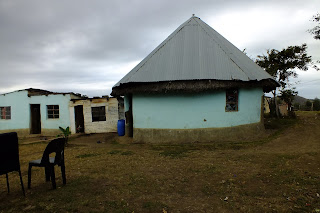Environmental issues are complicated and it would be much easier if someone could just say "palm oil is bad" or "boycott xxxx store" but it doesn't really work like that. There are nuances. And I think it is important to be honest about that, even if it does complicated the simple "DON'T DO X MESSAGE" because people need to be able to trust us... or else they will stop listening.
Try google "palm oil" and "environment" and you will find some of the controversy on this subject. There is this Smithsonian article about how giving up palm oil might be bad for the environment. There is also an IUCN article about how boycotting palm oil will lead to an increase in the use of other more land-hungry oils... Of course you will also find articles entitled "What is Palm Oil and Why it's Killing the Environment" and "Why is palm oil bad and what happened to the Iceland advert" (which is much more likely to get clicked on than "Saying ‘no’ to palm oil would likely displace, not halt biodiversity loss – IUCN report" - a note to scientists on getting clicks!!!!)
 |
| Source: https://phys.org/news/2014-11-great-apes-threat-palm-oil.html |
I like Orangutans (well, I like the idea of them existing, I haven't met one), so I definitely don't want their homes destroyed, ditto other things that live where we are now growing ridiculous amounts of oil (well, palm fruit for oil). Cutting down forests or replacing peat lands, also not awesome. Large scale monocultures (one type of crop) are pretty much never going to be awesome. We are probably not going to make as much fuss about turning over huge swathes of continents to wheat production, because the grasslands had their large herbivores hunted out ages ago and small things are cute and all, but they just don't get the same kind of press orangutans are going to get... (am I sounding cynical?) The issue is large scale monoculture more than any particular product, although some products are certainly worse than others.
For me, I almost think it is just easier to not eat palm oil so that my food doesn't have to be flavoured with any kind of guilt or orangutan tears... and if you feel like that there are some lists for palm oil free products in South Africa here and here.
Of course, then I need to also make sure there isn't some other oil, that is potentially worse - so maybe I just shouldn't be eating chocolates, biscuits or chips (or a huge amount of other stuff) and I will be healthier for it too. BUT, that is probably not going to happen. So what is the solution here? (In my humble and not at all expert opinion) Well, firstly, as far as possible we should be making our own stuff... but life is busy so...
Engage with the industry and ask them what their policy is about sourcing sustainable palm oil (it is possible, and hey palm fruit is native to Africa so would have less environmental impact and could have important positive economic impact to poorer regions). Our evil consumer-driven society means that if consumers say they will only buy things from sustainable sources, I am pretty sure that companies will make sure that they source things from sustainable sources? I am hopelessly optimistic about this but I believe in nagging! And I know that there are issues with the eco-labels and whether or not things that are labeled environmentally friendly really are, but I think we should encourage companies to keep striving for improved transparency and excellence and we should be supporting organisations who can legitimately provide neutral labels of sustainability.... Peer pressure is powerful - they taught us that at school! I like the Marine Stewardship Council, although I know they have also been criticized recently, but I think they are genuinely trying to encourage the fishing industry to be better - let's have similar rigorous and transparent standards for other industries. And we definitely shouldn't say that a company switching to environmental sources now is too little too late... we should be asking why on earth all the other companies aren't doing the same!!!!
I love Cadbury's Wholenut... and I tweeted and asked them about their palm oil policy and they didn't reply :( so I stopped buying their brand for a while, and obviously I must eat a lot of chocolate because next time I tweeted they did reply and with good news - so I went out and celebrated with some Wholenut! Next stop Bakers because... well... Salticrax.
However, the most important thing we should be doing is consuming less, LESS OF EVERYTHING. Less stuff. We should all be buying less stuff, we really don't need it. And in an ideal world the stuff we would be buying would have been produced locally, recently... that would be nice (because once upon a time, in my life time, we really did survive when avos and strawberries weren't available all year round). It isn't an ideal world and they don't grow cocoa in the western Cape so I can't really judge, but really, on this Black Friday... think Less is Really More... Please... for the sake of the orangutan (you know, they make umbrellas and display regional greetings - they really are very cute and deserve to have a home).

P.S. Wondering about the elephant?? I think there is only one simple environmental message - have fewer children - but it is one we are not allowed to say aloud... or maybe the Elephant has indeed left the room and we can (although I still don't feel like I can, because I don't have children which is a conscious decision, BY THE WAY, based on the awareness of ridiculously high population levels but people won't believe that anyway because I am also single.)
















